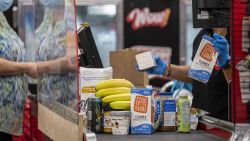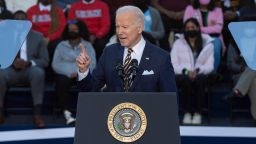Outside a Costco, Laura Godinez lifts meat, toothpaste, coffee, bottled water and bulk supplies of DayQuil from her cart – just the staples in a pandemic-era weekly shopping trip that is now often missing extras that might bust the family budget, like cookies and snacks.
Beside her truck, which used to cost $100 to fill but now takes $145 to top off, the 30-year-old construction worker feels exasperated as she assesses a $300 grocery bill that shoots up to $400 when she adds vegetables.
“I don’t want to say this, but when Donald Trump was here, it was nothing like this,” said Godinez, who said she used to lean Republican but has supported Democrats in recent years. “I’ve been worried, because instead of things getting better, it is getting worse every time. … I don’t know if it’s the President, or what happened, but (under Trump) it was so much better.”
More than 2,500 miles east, and in a different political universe, President Joe Biden’s top economic aides were blitzing news shows Wednesday, arguing that the day’s release of the worst inflation figures in 39 years actually contained glimmers of progress.
“It’s really important to get under the hood of these monthly inflation reports,” Biden economic adviser Jared Bernstein told CNN’s Jim Sciutto. “And if you look at the change from November to December, inflation is up half a percent. That’s considerably down from October and November, when inflation was up, .8 and .9%, respectively.”
On Capitol Hill, meanwhile, Democratic senators were locked in intense, emergency meetings. But they weren’t working to alleviate the pressures on people like Godinez. They were trying to persuade holdout moderates to change Senate rules to pass voting rights bills. The talks came a day after Biden effectively put his presidency on the line, declaring that the most important challenge before the country is the effort by Republicans to sabotage democracy.
These are three snapshots from a nation exhausted and driven to political distraction by the worst public health crisis in 100 years, its punishing economic consequences and the political estrangement left in the detritus of the Donald Trump presidency.
One year into the Biden administration, they hint at a disconnect between Democrats in Washington and the critical swing-state voters who will decide November’s midterm elections and are suffering genuine pain and anxiety. Such feelings explain a measure of nostalgia among some voters for the Trump economy of 2019, before anyone had ever heard of Covid-19. The sour national mood paints a path back to power for congressional Republicans in November – offering an easy opening for a classic message rooted in economic well being.
Did Democrats make a strategic error?
The deprivation felt in a swing state like Nevada, which is home to a key Senate race this year, and across the nation reflects the unpromising environment for Democrats trying to maintain control of Congress. It also raises questions about the legislative priorities of their narrow Senate and House majorities. The situation is not without irony, since Biden placed improving the lives of American workers at the center of his agenda.
The President’s sweeping social spending and climate change plan is specifically designed to help working Americans filling their trunks in Costco parking lots all over the country. It would expand child care, home care for the sick and elderly, education and cut the cost of health care. But even if a bill eventually squeezes through the Senate, any political payoff for Democrats will be years down the line and won’t bring immediate relief with lower grocery bills and gas prices. In fact, Wednesday’s cost of living data may cause West Virginia Sen. Joe Manchin, one of two Democrats along with Arizona Sen. Kyrsten Sinema currently holding up the program, to dig in since he’s warned about the impact on inflation of massive spending.
The reality Democrats may be missing is that people are hurting right now. There’s nothing more fundamental than struggling to feed a family. Voter testimony in Nevada recalls the evidence in the Virginia gubernatorial race when Republican Glenn Youngkin pulled off a shock win by actually listening to what voters were saying about education and the cost of groceries, while Democrats were running against the extremism of ex-President Trump.
Even some Nevada Democrats still loyal to Biden expressed frustration with what they view as their party’s inability to explain its accomplishments over the last year. Mark Weinberger, a 74-year-old retired dentist from Reno, described Biden’s communication as “piss poor.”
“Biden needed to communicate more of what he accomplished, and what he did, but none of that has been out,” Weinberger said.
The President’s aggressive political relaunch over the last week, in which he has called out Trump over the Capitol insurrection and compared opponents of voting rights reform to segregationists, has pleased some Washington pundits. But it may not go down quite so well out in the country.
It’s true that Trump and his acolytes pose the greatest threat to American democracy of modern times, and Democrats feel compelled to act. But lofty speeches over the right to vote, like Biden’s in Atlanta on Tuesday, can seem esoteric compared with the reality of a $400 grocery bill. And if Biden isn’t completely to blame for high inflation, he’s probably going to get the blame anyway. That’s how politics works.
Many economic experts argue that rising inflation can largely be explained by the extreme circumstances of the pandemic. Supply chains are clogged – as factories in Asia close amid waves of infections and transportation seizes up in ports and rail yards. Americans stuck at home for months have money to burn, further injecting demand into the economy and hiking prices.
But some voters in Nevada are convinced that by pumping trillions of public money into the economy with spending bills, Democrats caused soaring prices – a view being amplified by Republicans.
Jessica Morrison, a 41-year-old independent and single mom, thinks Democrats “jumped the gun” with their Covid relief package last year and “gave the aid too fast” – leading her to believe that caused the prices of everyday items to soar.
“I don’t think we needed it then,” she said of the government aid, arguing that she could do with the help now with goods hard to find and prices higher. “We did all this stuff, and everybody scaled back and now no one knows what to do. Pure chaos,” Morrison said.
It’s not unusual to find a contradiction between the lived experience of working Americans and the dry analysis of economic data. But politically, it doesn’t matter whether it is true that aid packages over cranked the economy. If enough voters believe that is the case, the damage could be incalculable for Biden, and to Democrats who face a long-shot battle to keep control of the House and the Senate.
The White House misjudged inflation
A sense that Washington is oblivious to the struggles of voters is the most disastrous scenario any party holding the majority can carry into national elections. This is one reason why repeated administration predictions that inflation was merely “transitory” – months ago – have come back to haunt the President. And while the economy is in many ways healthy – the unemployment rate is lower than it has been for years, stocks are rising and consumer spending roared through the holiday period – the grinding struggle of the Covid years, and the peculiarities of the pandemic economy worsened by the Omicron variant, have so far robbed Biden of any credit.
In the medium term, a country that is learning to live with the virus could see higher growth, lower inflation and some economic breathing room in the next year. But time is running out for a post-pandemic, preelection boom.
While some Republicans, like the House Minority Leader Kevin McCarthy, seem most concerned with proving to Trump they’d be vessels of his political revenge in the majority, others are directing a more focused, effective attack on the Democrats.
Rep. Kevin Brady of Texas, the top Republican on the House Ways and Committee who is not running for reelection in November, seized on government data showing that inflation surged year-on-year by 7% in December, the highest rate since June 1982, when Ronald Reagan was president and “E.T” was the big new movie release.
“This crushing report shows Democrats’ spending has pushed Bidenflation to achieve the highest prices in 40 years, killing family budgets and wiping out three years of wage gains,” Brady said in a statement.
“No one is buying Democrats’ excuses: The American people are suffering as they watch this Administration refuse to lift a finger to help them out of this crisis.” An email sent out by the Republican National Committee mailing list was even more scathing, mocking “bare shelves Biden.”
A bad message for November
In the 1980s, leaders of market economies lived in fear of the disastrous impact of inflation on their careers. But it’s been years since that was the case, which is one reason why rising prices may be so shocking now. While the inflation rate is well below its peak in that decade, the food price index climbed 6.3% last year and grocery prices rose 6.5%. It all adds up fast, especially for families already living from paycheck to paycheck.
And Omicron has only made matters worse.
Godinez says the highly infectious new variant aggravated the financial situation that she, her husband and her brother (who lives with them) are facing. Her husband, who works in carpentry, is not paid when he is sick and can’t work – a tough reality they are grappling with when they try to do the right thing by staying home to avoid exposing others if one of them is sick. “One week, one person was sick, and then (the next week) it was the other one, then the other one,” she said. “We don’t work a lot. … And who is going to pay us for this?”
Morrison’s political perspective is being shaped by her own reality. In her job at a convention center, she was expected to do “double the work for the same price” as the staff shrunk. “Being a single mom, I couldn’t just leave my kids” – who range in age from 6 to 18 – “to school themselves,” she said. Now she’s dipping into her savings and has little patience for what she sees as Democrats’ inability to solve what feels like an economic crisis.
“They’re the big dogs on the Hill. It’s their job to figure out how they’re going to help us survive,” she said.
Weinberger, the Reno dentist, worries that Biden’s struggle to corral a divided party will hurt him in November.
“I don’t think he’s consolidated control over the government,” said Weinberger, of a President whose approval rating hit 33% in a new Quinnipiac University poll on Wednesday, with low marks on his management of the economy, the pandemic and foreign policy.
“Everybody’s going off in all different directions in the Democratic Party. There’s no unifying stance on anything,” Weinberger said, remarking that such disarray was hardly a winning midterm election message.

























